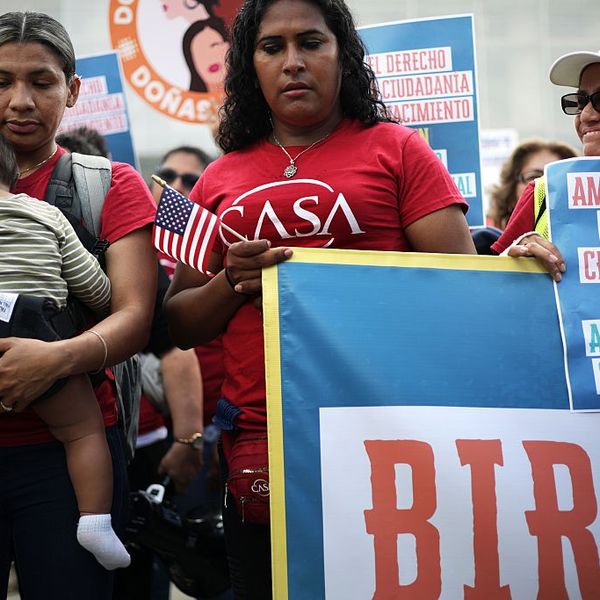States Take On Citizens United
Montana legal ruling a possible game-changer for states; California lawmakers introduce legislation to overturn Citizens United
Montana is proving to be a potential catalyst for change in the potential challenge to Citizens United v. Federal Election Commission. As Roll Call reports:
The Montana Supreme Court last week rejected a constitutional challenge to the state's century-old prohibition on independent corporate campaign expenditures. That Montana statute was technically nullified when the U.S. Supreme Court threw out federal limits on independent corporate and union political spending in 2010.
But unlike officials in many states with election laws upended by the ruling, who took steps to repeal or amend those statutes, Montana officials rose to their state law's defense. Montana Attorney General Steve Bullock went so far as to testify on Capitol Hill that the state's 1912 Corrupt Practices Act "is a system Montanans continue to believe in," effectively inviting a legal challenge.
Three Montana corporations took him up on it, arguing in Western Tradition Partnership v. Montana that the state law flies in the face of Citizens United v. Federal Election Commission and violates the First Amendment. A lower court agreed, but on Friday the state Supreme Court reversed that ruling, 5-2.
If the high court lets the Montana ruling stand, John Bonifaz, co-founder and director of the group Free Speech for People, said:
"...there would be enormous pressure on those states [that restricted corporate campaign spending in some way] to now start enforcing their laws or reinstating their laws." Conversely, if the Supreme Court reverses the Montana high court, he argued, his group's mission to overturn Citizens United through a constitutional amendment would receive an important boost.
"That kind of ruling would even more clearly demonstrate why a constitutional amendment is necessary to overturn the [Citizens United] ruling," he said.
As California legislators reconvene today, a resolution will be introduced calling for a constitutional amendment to overturn the U.S. Supreme Court's decision in Citizens United.
AP reports:
Two Assembly Democrats, Michael Allen of Santa Rosa and Bob Wieckowski of Fremont, plan to introduce a resolution Wednesday urging Congress to pass a constitutional amendment overturning the U.S. Supreme Court's Citizens United campaign finance ruling in 2010.
The ruling overturned prohibitions against corporations contributing money to political campaigns, leading to a surge of such donations during the 2010 election cycle. Public Citizen, a Washington, D.C.-based nonprofit advocacy group supporting the resolution, said Hawaii passed a similar measure last year and that other states are considering joining in.
Public Citizen stated that "California, which so often is ahead of the country in enacting forward-looking policies, is poised to be on the leading edge again."
This morning Democracy Now! interviewed Harvard Law School Professor Lawrence Lessig. Lessig argued that democracy was broken in America well before the 2010 Citizens United decision. He stated that "the tiniest slice of the 1% funds elections in America" and that the real solution will need to come from publicly funded elections.
An Urgent Message From Our Co-Founder
Dear Common Dreams reader, The U.S. is on a fast track to authoritarianism like nothing I've ever seen. Meanwhile, corporate news outlets are utterly capitulating to Trump, twisting their coverage to avoid drawing his ire while lining up to stuff cash in his pockets. That's why I believe that Common Dreams is doing the best and most consequential reporting that we've ever done. Our small but mighty team is a progressive reporting powerhouse, covering the news every day that the corporate media never will. Our mission has always been simple: To inform. To inspire. And to ignite change for the common good. Now here's the key piece that I want all our readers to understand: None of this would be possible without your financial support. That's not just some fundraising cliche. It's the absolute and literal truth. We don't accept corporate advertising and never will. We don't have a paywall because we don't think people should be blocked from critical news based on their ability to pay. Everything we do is funded by the donations of readers like you. Will you donate now to help power the nonprofit, independent reporting of Common Dreams? Thank you for being a vital member of our community. Together, we can keep independent journalism alive when it’s needed most. - Craig Brown, Co-founder |
Montana is proving to be a potential catalyst for change in the potential challenge to Citizens United v. Federal Election Commission. As Roll Call reports:
The Montana Supreme Court last week rejected a constitutional challenge to the state's century-old prohibition on independent corporate campaign expenditures. That Montana statute was technically nullified when the U.S. Supreme Court threw out federal limits on independent corporate and union political spending in 2010.
But unlike officials in many states with election laws upended by the ruling, who took steps to repeal or amend those statutes, Montana officials rose to their state law's defense. Montana Attorney General Steve Bullock went so far as to testify on Capitol Hill that the state's 1912 Corrupt Practices Act "is a system Montanans continue to believe in," effectively inviting a legal challenge.
Three Montana corporations took him up on it, arguing in Western Tradition Partnership v. Montana that the state law flies in the face of Citizens United v. Federal Election Commission and violates the First Amendment. A lower court agreed, but on Friday the state Supreme Court reversed that ruling, 5-2.
If the high court lets the Montana ruling stand, John Bonifaz, co-founder and director of the group Free Speech for People, said:
"...there would be enormous pressure on those states [that restricted corporate campaign spending in some way] to now start enforcing their laws or reinstating their laws." Conversely, if the Supreme Court reverses the Montana high court, he argued, his group's mission to overturn Citizens United through a constitutional amendment would receive an important boost.
"That kind of ruling would even more clearly demonstrate why a constitutional amendment is necessary to overturn the [Citizens United] ruling," he said.
As California legislators reconvene today, a resolution will be introduced calling for a constitutional amendment to overturn the U.S. Supreme Court's decision in Citizens United.
AP reports:
Two Assembly Democrats, Michael Allen of Santa Rosa and Bob Wieckowski of Fremont, plan to introduce a resolution Wednesday urging Congress to pass a constitutional amendment overturning the U.S. Supreme Court's Citizens United campaign finance ruling in 2010.
The ruling overturned prohibitions against corporations contributing money to political campaigns, leading to a surge of such donations during the 2010 election cycle. Public Citizen, a Washington, D.C.-based nonprofit advocacy group supporting the resolution, said Hawaii passed a similar measure last year and that other states are considering joining in.
Public Citizen stated that "California, which so often is ahead of the country in enacting forward-looking policies, is poised to be on the leading edge again."
This morning Democracy Now! interviewed Harvard Law School Professor Lawrence Lessig. Lessig argued that democracy was broken in America well before the 2010 Citizens United decision. He stated that "the tiniest slice of the 1% funds elections in America" and that the real solution will need to come from publicly funded elections.
Montana is proving to be a potential catalyst for change in the potential challenge to Citizens United v. Federal Election Commission. As Roll Call reports:
The Montana Supreme Court last week rejected a constitutional challenge to the state's century-old prohibition on independent corporate campaign expenditures. That Montana statute was technically nullified when the U.S. Supreme Court threw out federal limits on independent corporate and union political spending in 2010.
But unlike officials in many states with election laws upended by the ruling, who took steps to repeal or amend those statutes, Montana officials rose to their state law's defense. Montana Attorney General Steve Bullock went so far as to testify on Capitol Hill that the state's 1912 Corrupt Practices Act "is a system Montanans continue to believe in," effectively inviting a legal challenge.
Three Montana corporations took him up on it, arguing in Western Tradition Partnership v. Montana that the state law flies in the face of Citizens United v. Federal Election Commission and violates the First Amendment. A lower court agreed, but on Friday the state Supreme Court reversed that ruling, 5-2.
If the high court lets the Montana ruling stand, John Bonifaz, co-founder and director of the group Free Speech for People, said:
"...there would be enormous pressure on those states [that restricted corporate campaign spending in some way] to now start enforcing their laws or reinstating their laws." Conversely, if the Supreme Court reverses the Montana high court, he argued, his group's mission to overturn Citizens United through a constitutional amendment would receive an important boost.
"That kind of ruling would even more clearly demonstrate why a constitutional amendment is necessary to overturn the [Citizens United] ruling," he said.
As California legislators reconvene today, a resolution will be introduced calling for a constitutional amendment to overturn the U.S. Supreme Court's decision in Citizens United.
AP reports:
Two Assembly Democrats, Michael Allen of Santa Rosa and Bob Wieckowski of Fremont, plan to introduce a resolution Wednesday urging Congress to pass a constitutional amendment overturning the U.S. Supreme Court's Citizens United campaign finance ruling in 2010.
The ruling overturned prohibitions against corporations contributing money to political campaigns, leading to a surge of such donations during the 2010 election cycle. Public Citizen, a Washington, D.C.-based nonprofit advocacy group supporting the resolution, said Hawaii passed a similar measure last year and that other states are considering joining in.
Public Citizen stated that "California, which so often is ahead of the country in enacting forward-looking policies, is poised to be on the leading edge again."
This morning Democracy Now! interviewed Harvard Law School Professor Lawrence Lessig. Lessig argued that democracy was broken in America well before the 2010 Citizens United decision. He stated that "the tiniest slice of the 1% funds elections in America" and that the real solution will need to come from publicly funded elections.

